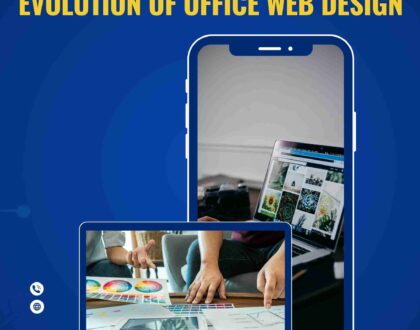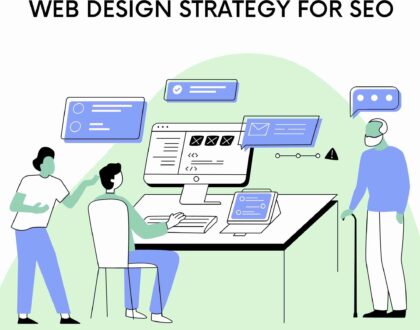Evolution of Office Web Design – In today’s dynamic digital landscape, the traditional concept of office spaces has undergone a significant transformation. With the rise of remote work and flexible arrangements, businesses are rethinking their approach to office design, both physical and virtual. As a result, the demand for flexible office web design has surged, driven by the need to create adaptable digital environments that cater to the diverse needs of modern workplaces.
Embracing Flexibility: The Evolution of Office Web Design
In this comprehensive guide, we’ll delve into the intricacies of flexible office web design, exploring its principles, benefits, and best practices. From responsive layouts to intuitive user experiences, we’ll uncover the key elements that define effective office web design in an era of flexibility.
Chapter 1: Understanding Flexible Office Design
1.1 The Shift Towards Flexibility:
- Explore the factors driving the transition towards flexible office arrangements.
- Discuss the impact of remote work trends and changing workplace dynamics on office design.
- Highlight the importance of adaptability and scalability in modern office environments.
1.2 Defining Flexible Office Web Design:
- Define flexible office web design and its role in supporting agile work practices.
- Discuss the core principles of flexibility, including responsiveness, scalability, and user-centricity.
- Illustrate how flexible design enables seamless transitions between different devices and screen sizes.
Chapter 2: Key Elements of Flexible Office Web Design
2.1 Responsive Layouts:
- Explain the concept of responsive design and its significance in accommodating diverse user devices.
- Discuss the use of fluid grids, flexible images, and media queries to create responsive layouts.
- Provide examples of websites with effective responsive designs for office environments.
2.2 Modular Design:
- Introduce the concept of modular design and its benefits for flexible office web layouts.
- Explore how modular components enable easy customization and reconfiguration of web interfaces.
- Showcase case studies of websites leveraging modular design principles for enhanced flexibility.
2.3 Scalable Typography:
- Highlight the importance of scalable typography in accommodating varying screen sizes and resolutions.
- Discuss techniques for implementing fluid typography using CSS viewport units and responsive fonts.
- Showcase examples of websites with well-executed typography for flexible office environments.
2.4 Flexible Navigation:
- Explore strategies for designing flexible navigation systems that adapt to different screen sizes and user preferences.
- Discuss the use of collapsible menus, off-canvas navigation, and simplified navigation structures.
- Provide examples of websites with intuitive navigation designs for flexible office web experiences.
Chapter 3: Creating User-Centric Experiences
3.1 Understanding
…
Read the rest Resell Web Design Strategy for SEO – In today’s digital age, having a strong online presence is crucial for the success of any business. As more and more consumers turn to the internet to find products and services, businesses must ensure that their websites are not only visually appealing but also optimized for search engines. This is where reselling web design with a focus on SEO (Search Engine Optimization) comes into play. In this comprehensive guide, we will explore the ins and outs of reselling web design services with an emphasis on SEO strategies, providing detailed explanations and information for both humans and search engines.
Resell Web Design Strategy for SEO: A Comprehensive Guide
A. Understanding the Importance of Web Design and SEO
Before delving into the strategies for reselling web design with SEO in mind, it’s essential to understand the significance of both aspects individually.
- The design of a website plays a crucial role in attracting and retaining visitors. A well-designed website not only looks aesthetically pleasing but also enhances user experience, making it easy for visitors to navigate and find the information they need. Additionally, factors such as site speed, mobile responsiveness, and intuitive layout contribute to the overall effectiveness of web design.
- Search Engine Optimization is the process of optimizing a website to improve its visibility and ranking on search engine results pages (SERPs). By implementing various SEO techniques, such as keyword optimization, content creation, link building, and technical optimization, businesses can increase their organic traffic and attract more potential customers.
B. The Synergy between Web Design and SEO
While web design and SEO are often treated as separate entities, they are inherently interconnected. A well-designed website forms the foundation for effective SEO implementation, while SEO strategies can further enhance the performance and visibility of a website. Here’s how these two elements work together:
User Experience (UX):
- A user-friendly website design not only improves the overall experience for visitors but also aligns with search engine algorithms. Search engines prioritize websites that offer a positive user experience, including fast loading times, easy navigation, and mobile responsiveness.
Content Organization:
- A well-structured website design facilitates the organization and presentation of content, making it easier for search engines to crawl and index pages. Clear navigation menus, internal linking, and logical page hierarchy contribute to better SEO performance by ensuring that content is easily accessible to
…
Read the rest Real Estate Agent Website Design – In today’s digital age, having a strong online presence is essential for success in the real estate industry. A well-designed website can be a powerful tool for real estate agents, helping them attract clients, showcase properties, and build their brand. In this comprehensive guide, we’ll explore the ins and outs of real estate agent website design, covering everything from essential features to design best practices.
Ultimate Guide to Real Estate Agent Website Design: Creating a Stunning Online Presence
Chapter 1: Understanding the Importance of a Real Estate Agent Website
1.1. The Role of Websites in the Real Estate Industry
- Overview of how websites have revolutionized the way people search for properties.
- Importance of having a professional website as a real estate agent.
1.2. Benefits of Having a Website for Real Estate Agents
- Increased visibility and exposure.
- Enhanced credibility and professionalism.
- Improved lead generation and conversion rates.
- Better client communication and engagement.
Chapter 2: Essential Features of Real Estate Agent Websites
2.1. Property Listings
- Importance of having a comprehensive and user-friendly property search feature.
- Tips for organizing listings by categories such as location, price, and property type.
- Integration with MLS (Multiple Listing Service) for accurate and up-to-date property data.
2.2. High-Quality Imagery and Virtual Tours
- Importance of high-resolution images and videos in showcasing properties.
- Incorporating virtual tours for an immersive viewing experience.
- Tips for optimizing images and videos for fast loading times.
2.3. Property Details and Descriptions
- Providing detailed information about each property, including features, amenities, and nearby attractions.
- Writing compelling property descriptions that highlight key selling points and evoke emotion.
- Using clear and concise language to communicate with potential buyers.
2.4. Contact Information and Inquiry Forms
- Placing contact information prominently on every page of the website.
- Using inquiry forms to capture leads and inquiries from potential clients.
- Ensuring that contact forms are easy to use and mobile-friendly.
Chapter 3: Design Best Practices for Real Estate Agent Websites
3.1. Responsive Design
- Importance of responsive design for compatibility across all devices and screen sizes.
- Tips for designing mobile-friendly layouts and navigation menus.
- Testing website responsiveness using tools like Google’s Mobile-Friendly Test.
3.2. Clean and Modern Layouts
- Importance of clean and modern design aesthetics in creating a professional impression.
- Using white space effectively to improve readability and visual appeal.
- Incorporating high-quality graphics and typography for a polished look.
3.3. Intuitive Navigation
- Importance of intuitive navigation menus
…
Read the rest Real Estate Web Design – In today’s digital age, the real estate industry is not just about physical properties; it’s also about virtual spaces. As potential buyers and sellers increasingly turn to the internet to search for properties, having an effective online presence has become crucial for real estate professionals. And at the heart of this online presence lies real estate web design.
The Ultimate Guide to Real Estate Web Design: Crafting Digital Experiences for Success
In this comprehensive guide, we’ll delve into the intricacies of real estate web design, exploring its importance, key elements, best practices, and tips for success. Whether you’re a real estate agent, broker, or property developer, understanding the principles of effective web design can help you stand out in a crowded market and attract more clients.
Chapter 1: The Importance of Real Estate Web Design
1.1. Digital First Impressions
- In the digital realm, your website is often the first point of contact between you and potential clients. A well-designed website can make a lasting impression and instill trust in visitors, whereas a poorly designed one can drive them away. We’ll discuss how effective web design can help you make a positive first impression and set the stage for successful client relationships.
1.2. Brand Identity and Differentiation
- Your website is an extension of your brand identity. Through thoughtful design choices, you can convey your brand’s values, personality, and unique selling propositions. We’ll explore strategies for creating a distinct brand identity in a competitive market and how it can help you stand out from the crowd.
1.3. User Experience and Conversion Optimization
- User experience (UX) plays a critical role in determining the success of your website. A seamless, intuitive user experience can lead to higher engagement, increased conversions, and ultimately, more business opportunities. We’ll delve into the principles of UX design and how you can optimize your website for maximum conversion.
Chapter 2: Key Elements of Real Estate Web Design
2.1. Responsive Design
- With the proliferation of mobile devices, responsive design has become indispensable for real estate websites. We’ll discuss the importance of mobile optimization and how responsive design ensures a consistent and user-friendly experience across different devices.
2.2. Visual Content
- In the real estate industry, visuals are paramount. High-quality images, videos, and virtual tours can showcase properties in their best light and captivate potential buyers. We’ll explore how to leverage visual content effectively and
…
Read the rest





